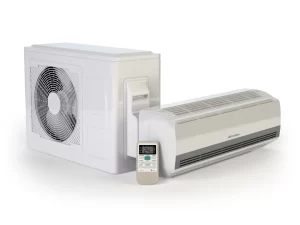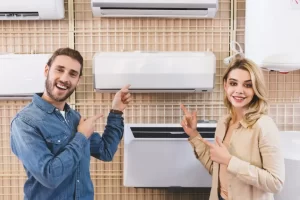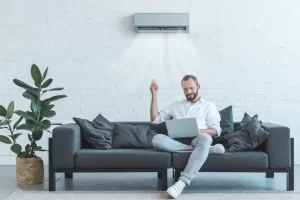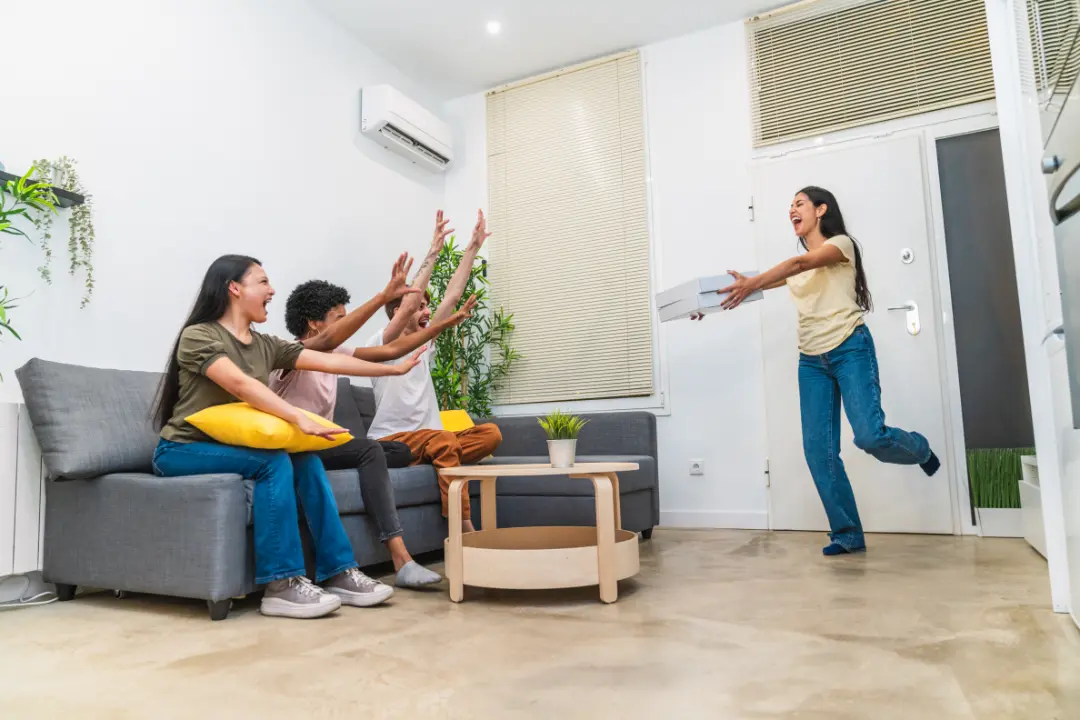Air conditioners are essential for both homes and workplaces, offering improved air quality, enhanced comfort, and increased productivity by managing heat from appliances and the human body. To help you make an informed decision, we’ve compiled a comprehensive guide covering the best air conditioners for installation, their features, capacity considerations, and tips for choosing the best air conditioner for your needs.
Key Takeaways
- Learn the differences between wall/window, ducted, split system air conditioners, and more to find the perfect air conditioner for your space and needs.
- Evaluate factors like the size of the air conditioner, energy ratings, inverter technology, and additional features such as air conditioner filters, dehumidifiers, and smart controls to enhance your air conditioner’s performance.
- Ensure proper installation and regular maintenance of indoor and outdoor units for optimal performance and longevity of your new air conditioner.
Key Factors to Consider When Buying an Air Conditioner
When purchasing an air conditioner, it’s crucial to evaluate the unit type, capacity, energy rating, and specific features. Here’s a breakdown of these factors:

1. Decide on Your Choice of Air Conditioning Unit Type
There are several types of air conditioners, each suited for different spaces and needs. Here’s a look at the main types:
Wall / Window Air Conditioner
The wall/window AC is ideal for controlling room temperature in a small space. This unit is installed in the wall or window and can cool a room at about 50 square metres. It is the cheapest among the lot and easy to install.
Pros
- Easy to install
- Excellent cooling capacity in a small room
- It can be mounted on a wall or window
- Despite its features, this unit may have some downsides, and they are.
Cons
- Can be noisy
- High energy consumption
Ducted Air Conditioners
A ducted air conditioning system provides the needed temperature through ducts spread throughout the office or home. It is much more expensive than the others because its coverage is widespread for maximum range.
Pros
- Ideal for large homes and commercial buildings
- Wide airflow range with zonal control
- Efficient cooling and heating
Cons
- High upfront and running costs
- Best suited for larger properties
Split System Air Conditioners
Split systems include an indoor and outdoor unit connected by tubing, offering quiet and efficient cooling.
Pros
- Strong cooling capacity
- Relatively affordable compared to ducted systems air conditioners.
- It can target a particular area of the room.
Cons
- Professional installation required
- Higher initial cost compared to window units
Multi-Split System Air Conditioner
A more complex form of the split air conditioner, the multi-split system can connect about five indoor units to a single outdoor unit. This system offers a great way to cool two or more rooms within the same radius without the need for a duct.
Pros
- Ideal for cooling multiple rooms
- Low power consumption
- Flexible installation options
Cons
- Not suitable for widely separated rooms
- Not recommended for small spaces
Portable Air Conditioners
Portable air conditioners are handy for small, owned or rented spaces. Because they require no installation, they are easy to move, less expensive, do not take up much space, and weigh less than most air conditioners.
Pros:
- No installation costs
- Portable and space-saving
- Remote control and timer features
Cons:
- A portable air conditioner is limited to small areas
- Less efficient than built-in units
Reverse-Cycle Air Conditioners
A Reverse-cycle air conditioner is a type of air conditioning system that can both cool and heat your home. It works by reversing the refrigeration cycle, allowing it to extract heat from the outside air and transfer it indoors for heating or vice versa for cooling.
This makes them a versatile and energy-efficient option for year-round comfort.
Pros
- Provides both heating and cooling, eliminating the need for separate systems.
- It can be more energy-efficient than traditional heating and cooling systems, especially in mild climates.
- Can help reduce your carbon footprint by using renewable energy sources like solar power.
- Many reverse-cycle units are designed to operate quietly.
- Some models can help improve indoor air quality by filtering out pollutants through air purification.
Cons
- Reverse-cycle units typically have a higher upfront cost than traditional systems.
- Can experience frost formation on outdoor units in cold weather, which can reduce efficiency.
- Outdoor units can generate noise, especially in close proximity to living areas.

2. Choose Between an Inverter Air Conditioner or Non- Inverter AC
Inverter Air Conditioners
This cooling system utilises a controlled compressor that adjusts the compressor speed according to the cooling demand, making it more energy-efficient than traditional units. Inverter models are in demand as they use less energy for efficient cooling.
Pros
- Energy-saving, reducing power bills
- Quiet operation
- Better temperature control
Cons
- More expensive upfront
- Available primarily in split systems
Non-Inverter Air Conditioners
Unlike inverter air conditioning units, non-inverter units operate on a simple on/off cycle, turning the compressor fully on or off to maintain desired temperatures. This can lead to fluctuations in cooling and energy consumption.
Pros
- Generally more affordable than inverter units.
- Delivers a fixed amount of power in a room based on its temperature
- Constant supply of cool air when at maximum capacity
Cons
- Higher energy consumption compared to inverter units.
- May experience temperature swings due to on/off cycling.
- It can be louder than inverter units due to the frequent compressor start-ups and shutdowns.
3. Determine the Air Conditioner Capacity Best for Your Property
Selecting the right air conditioner capacity is crucial for effective cooling and energy efficiency. To find the best fit, consider the room size, location, noise tolerance, local climate, number of occupants, and energy ratings. Here are key factors to guide your choice:
- Room Size: For spaces up to 80 square metres, wall/window, portable, or split system units are usually sufficient. For larger rooms (110 square metres or more), you might need more powerful options, such as multi-split or ducted systems.
- Location and Climate: In hotter climates, you may need a higher-capacity unit to maintain comfort. For example, a 150-square-metre living room in a hot region with five occupants may require a 2-ton (24,000 BTU) air conditioner.
- Occupancy and Usage: More people generate more heat, necessitating higher cooling capacity. Rooms with high foot traffic or extensive appliance use might also need a more robust unit.
- Noise Levels: Consider quieter models for bedrooms or areas where noise may be disruptive. Split systems and ducted units typically offer quieter operation compared to window or portable units.
By carefully evaluating these factors, you can ensure that your chosen air conditioner meets your property’s needs efficiently and cost-effectively.
4. Choose the Most Energy-Efficient Air Conditioner for Your Space
Air conditioners vary significantly in their power consumption. Some models use more energy to cool a room effectively, while others are designed to be more energy-efficient. The key is understanding how well an air conditioner can remove warm air and replace it with cool air, impacting your comfort and energy bills.
When choosing an air conditioner, consider its energy efficiency to save money over time. While energy-efficient models may come with a higher upfront cost, they typically offer significant savings on energy bills. Manufacturers use an Energy Efficiency Ratio (EER) rating system, marked with star stickers ranging from one to five stars, to indicate how efficiently an air conditioner uses energy. Higher star ratings mean better efficiency and lower operating costs.
5. Explore the Features of Your Air Conditioner
When selecting an air conditioner, the features it offers can make a big difference in your satisfaction. Beyond just cooling your space, modern air conditioners come with a range of advanced features designed to enhance comfort and convenience. These features can transform your experience from basic to exceptional.
Sleep Mode
Sleep Mode adjusts the room temperature gradually to ensure a comfortable night’s rest without sudden changes.
Air Filters
Air conditioners come with two types of filters: washable and standard. Washable filters can be cleaned and reused, while standard filters need to be replaced periodically. Both types help improve air quality by removing dust, allergens, and other particles.
Adjustable Louvres
Adjustable louvres allow you to direct airflow precisely where you need it.
Adjustable Fan Speed
With adjustable fan speed, you can control how quickly the fan blows.
Programmable Timer
The programmable timer allows you to set specific times for the AC to turn on or off. This feature helps save energy by operating the unit only when needed and ensuring it doesn’t run unnecessarily.
Dehumidifier Mode
Dehumidifier Mode removes excess moisture from the air, reducing humidity and improving air quality by eliminating dust and pollutants.
Wi-Fi Compatibility
Wi-Fi compatibility allows you to control your air conditioner remotely using a smartphone app. This feature provides convenience by letting you adjust settings from anywhere.
Energy-Saving Mode
Energy-saving mode adjusts the unit’s operation to use less power while maintaining comfort. This feature helps reduce energy consumption and lower utility bills.
Dual-Zone or Multi-Zone Cooling
This feature allows the air conditioner to cool multiple rooms or zones independently. It’s ideal for larger homes or offices where different areas require different temperatures.
Quiet Operation
Look for models with a quiet operation mode if noise is a concern. These units are designed to minimise sound while running, providing a more peaceful environment.
Self-Clean Features
This feature automatically cleans and dries the inside of the indoor air conditioner unit. The self-cleaning function prevents the growth of microorganisms and prevents rusting to provide cleaner and healthy air.

6. Power Consumption and Cost Considerations
The cost of running an air conditioner depends on its energy consumption. More energy-efficient models, while more expensive upfront, can save you money in the long run. Here are tips to manage costs:
- Choose Energy-Efficient Models: Look for high energy ratings to ensure lower power bills.
- Use Thermostats: Set reasonable temperatures to reduce energy usage.
- Opt for Proper Sizing: Ensure the AC is appropriately sized for your room to avoid excess energy consumption.
- Utilise Economy Mode: This setting minimises power usage while maintaining comfort.
Installation Tips
All air conditioners will need to be installed by a professional apart from the portable ones. The licensed installer will get things done correctly and safely as you continue to enjoy the warranty from manufacturers.
Let SmartWay Air Conditioning Help
Choosing the right air conditioner can seem overwhelming, but with the right guidance, it’s easier than you think. At SmartWay Air Conditioning, we offer expert installation and repair services to ensure you get the perfect AC for your needs. Whether you’re looking for a new unit or need maintenance on an existing one, we’re here to help.
Ready to enjoy a cooler, more comfortable space? Check out the areas we serve, and let us handle your air conditioning needs!
Experience Exceptional Service with SmartWay Air Conditioning
At SmartWay Air Conditioning, we specialise in delivering top-notch repair, service, and installation solutions for all your air conditioning and heating needs. Our team of expert technicians is available 24/7, providing reliable, high-quality service throughout Sydney to keep your systems running efficiently all year round. From quick repairs to comprehensive maintenance and new installations, we are committed to ensuring your comfort and satisfaction with every job.
Choosing SmartWay Air Conditioning means partnering with a dedicated team that prioritises your comfort and convenience. Whether you’re dealing with an unexpected breakdown, need regular maintenance, or are looking to upgrade your system, we’re here to deliver fast, professional service that meets your needs and exceeds your expectations.
Ready to enjoy unparalleled air conditioning services in Sydney? Contact us today for a free estimate.
Frequently Asked Questions
How do I choose the right size air conditioner?
Refer to an air conditioner buying guide to match the unit’s capacity with your room size. The perfect air conditioner should cool efficiently without wasting energy.
What is a split system air conditioner?
A split-system air conditioner has indoor and outdoor units. The indoor unit cools the room, while the outdoor unit removes hot air, ensuring effective cooling.
How important is the air conditioner filter?
A clean air conditioner filter improves your air conditioner’s performance by enhancing airflow and air quality. Regular maintenance helps keep your new air conditioner running smoothly.
What affects an air conditioner’s performance?
Factors like the size of the air conditioner, clean air conditioner filter, and well-maintained indoor unit impact the air conditioner’s performance, ensuring it efficiently manages hot air.
Conclusion
Investing in the right air conditioner can dramatically improve your comfort, air quality, and overall satisfaction in your space. By understanding the different types, capacities, and features available, you can make an informed decision that meets your specific needs. From selecting the ideal unit type to considering energy efficiency and unique features, each step of the process plays a critical role in ensuring you get the best performance and value from your air conditioner.
As you embark on your air conditioning journey, remember that professional guidance and installation can make all the difference. Choose SmartWay Air Conditioning for expert installation.


